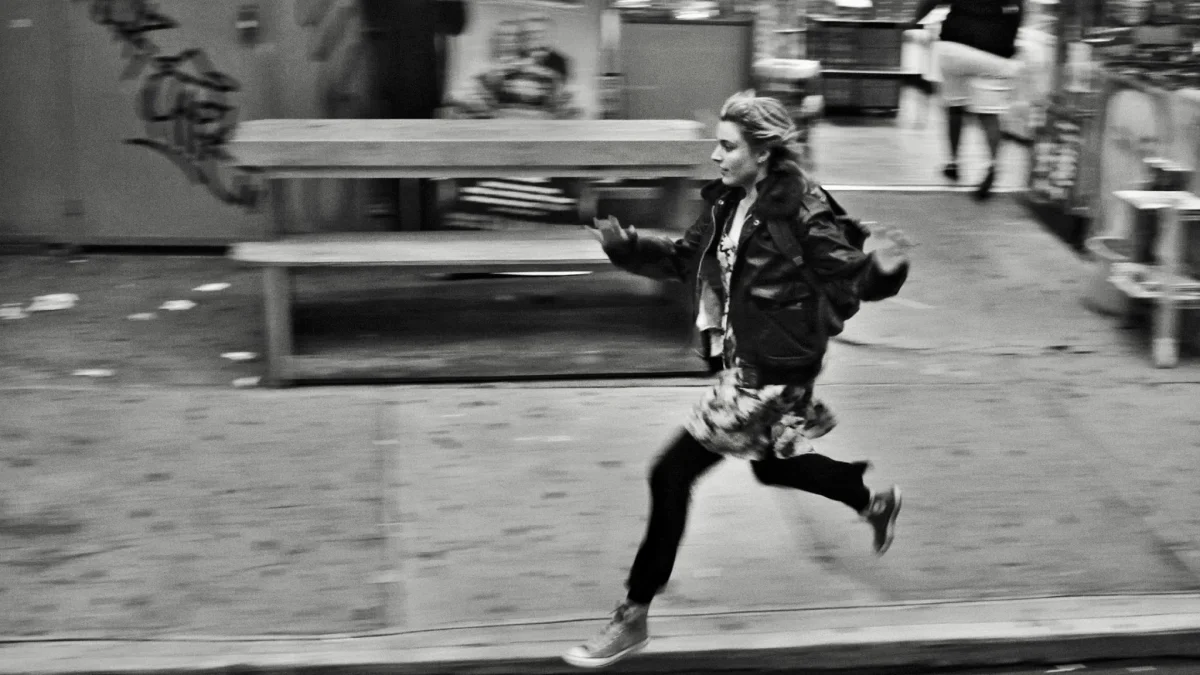-
Drop The Needle: 'Frances Ha' breaks Bowie's 'Modern Love' free
by Mitchel Green - August 10, 2023
|
mitchelgreen34@gmail.com

This is the latest in an ongoing series about great needle drops throughout film history. What’s a needle drop? It’s the use of pop songs not created for the film it appears in — existing pieces of classical music (shoutout Bob Fosse’s use of Antonio Vivaldi’s “Concerto in G” in “All That Jazz”) or songs written specifically for the movie (shoutout Spike Lee’s use of Public Enemy’s “Fight the Power” in “Do The Right Thing”) might get their own special pieces. Movies have influenced my taste in music more than anything else, so I wanted to highlight and celebrate that influence here.
In the last edition of this series, I wrote about how films were my primary mode of discovering new music when I was younger. To this day, the 60s and 70s songs that populated the soundtracks of Quentin Tarantino, Wes Anderson, and Martin Scorsese’s films remain in my listening rotation. But, as much as I love these tracks, the unfortunate consequence of discovering music this way is that I can only ever associate these songs with the movies that introduced me to them. The feelings I have toward the songs were generated by the film, not by the song itself.
The reverse of this situation is when I see a film that uses a song that I already know and love. It oftentimes feels like a cheap tactic to make me feel something the film didn’t organically generate — Taika Waititi’s use of David Bowie’s “Heroes” at the end of “Jojo Rabbit” felt particularly manipulative given its subject matter. When you already associate certain feelings with certain songs, hearing them in a new context creates a strange, uncomfortable dissonance — this is sometimes intentional, but it still rarely feels earned. There are, however, occasions where a film uses a song I already know and love so effectively that it completely recontextualizes the music for me. My favorite example of this is Noah Baumbach’s use of David Bowie’s “Modern Love” in his film “Frances Ha.”
David Bowie was one of the first artists I discovered on my own — by which I mean my usual ways of finding music, movies and my parents, didn’t introduce me to him. I’m sure I had heard Bowie songs before, but he was one of the first musicians I decided to dive into the entire discography of. For the first time, I found an artist that I felt spoke to me directly. One that was never satisfied with being just one thing. One who wanted to do it all and (though perhaps not successfully) did by constantly reinventing himself. One who, despite being a quiet introvert, embraced theatricality and performance to find his voice. Art gave him freedom, and I found that beautiful.
As much as I love Bowie and his work, I find myself sticking almost strictly to his ‘70s output. Not surprising given it is the consensus best period of his career, but it’s mainly because this is where Bowie takes his biggest sonic risks. From baroque piano rock to dirty blues rock to new-age electronic music, Bowie was constantly pushing pop music boundaries to their limits. And then in the ‘80s, like most pop music of that time, progress stopped. Bowie stopped creating trends and started chasing him. The 1983 album “Let’s Dance” is Bowie going full-on dance pop. Though it has a couple of highlights, this is the end of Bowie’s peak as an artist.
One of those highlights is the album’s opening track “Modern Love” which, while not a personal favorite on first listen, was still one of my favored tracks from Bowie’s 80s period. I liked it, but to me the song still represented Bowie being put in a box. The freedom that drew me to his music in the first place seemed almost completely lost in his “new” sound. Almost. The freedom of Bowie’s music was still there in “Let’s Dance,” it just needed to be heard in a new context. Coming to it as a song on an album generally considered lesser in quality than what came before, I took that preconception to the work. “Modern Love” isn’t a song that’s light on energy, but that energy feels static. It feels like energy building up and trying to break free. What breaks the song free is movement.
In “Frances Ha,” the song is set to a scene of Frances (Greta Gerwig) running and dancing through the streets of New York. The camera glides with Frances as she skips, twirls, and jumps. Baumbach is not a director that, at least to this point in his career, moves the camera much — at least not this dynamically. Much of “Frances Ha” is shot in static long takes, which allows the actor’s freedom of movement, but still feel claustrophobic as their movement is confined to the space in the frame. Here, a whole new world has opened up. Not only is Frances feeling more joyful and free to be herself, but Baumbach has given his camera freedom. A whole new world has opened up to both the character and the filmmaker.
I can’t listen to “Modern Love” without thinking of “Frances Ha” anymore. The two are forever linked in my mind, and I wouldn’t want it any other way. Baumbach’s film didn’t change my feelings on the song, it expanded upon them. It created meaning in what I once felt was a relatively empty part of Bowie’s discography. There wasn’t the dissonance that usually comes with hearing songs I am familiar with in movies because it was like hearing a completely new song.

